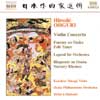Ohguri Violin Concerto and other orchestral works
Exciting pieces from a Japanese composer drawing on religious ritual
View record and artist detailsRecord and Artist Details
Composer or Director: Hiroshi Ohguri
Genre:
Orchestral
Label: Naxos
Magazine Review Date: 8/2003
Media Format: CD or Download
Media Runtime: 68
Mastering:
Stereo
DDD
Catalogue Number: 8 555321

Tracks:
| Composition | Artist Credit |
|---|---|
| Concerto for Violin and Orchestra |
Hiroshi Ohguri, Composer
Hiroshi Ohguri, Composer Kazuhiro Takagi, Violin Osaka Philharmonic Orchestra Tatsuya Shimono, Conductor |
| Fantasy on Osaka Folk Tunes |
Hiroshi Ohguri, Composer
Hiroshi Ohguri, Composer Osaka Philharmonic Orchestra Tatsuya Shimono, Conductor |
| Legend |
Hiroshi Ohguri, Composer
Hiroshi Ohguri, Composer Osaka Philharmonic Orchestra Tatsuya Shimono, Conductor |
| Rhapsody on Osaka Nursery Rhymes |
Hiroshi Ohguri, Composer
Hiroshi Ohguri, Composer Osaka Philharmonic Orchestra Tatsuya Shimono, Conductor |
Author: bwitherden
Just as London is untypical of England, Tokyo does not epitomise Japan. Osakans, it seems, are more informal, outgoing and loquacious. Osaka-born Ohguri (1918-82) discovered Western music at 13, learned the French horn at high school, then moved to Tokyo and eventually took the principal’s chair in what is now the NHK Symphony. Within three years he resigned to return home. In 1950 he joined the Kansai Symphony (now the Osaka SO) where he stayed until 1966.
The Concerto, written in 1963, has a number of fine lyrical passages, especially in the first two movements, but is dominated by some ferocious writing, realised with commendable punch and brio by soloist and orchestra. The first movement is in conventional sonata form but, as the composer declared, it’s more about rhythm than the development of the subjects. The slow movement comprises variations on a nursery rhyme, itself derived from a Buddhist chant, and demonstrates that Ohguri could conjure with melody as skillfully as with rhythm. The Fantasy, heard here in its 1970 revision, was a great success when premièred in 1956. Ohguri again draws on traditional material from religious rituals, both Buddhist and Shinto.
The other two works date from the 1970s. Legend is a vigorous programmatic work, describing how the sun god became a hermit, plunging the earth into darkness. Ohguri maps out the action clearly while avoiding pedestrian literalism. The Rhapsody brilliantly juggles lullabies, nursery rhymes and game-songs in a kind of virtuoso quodlibet. All these pieces bustle with vivid instrumental colours, muscular melodies and incisive rhythms, and the performances, energetic and sharply focused, bring them excitingly to life.
The Concerto, written in 1963, has a number of fine lyrical passages, especially in the first two movements, but is dominated by some ferocious writing, realised with commendable punch and brio by soloist and orchestra. The first movement is in conventional sonata form but, as the composer declared, it’s more about rhythm than the development of the subjects. The slow movement comprises variations on a nursery rhyme, itself derived from a Buddhist chant, and demonstrates that Ohguri could conjure with melody as skillfully as with rhythm. The Fantasy, heard here in its 1970 revision, was a great success when premièred in 1956. Ohguri again draws on traditional material from religious rituals, both Buddhist and Shinto.
The other two works date from the 1970s. Legend is a vigorous programmatic work, describing how the sun god became a hermit, plunging the earth into darkness. Ohguri maps out the action clearly while avoiding pedestrian literalism. The Rhapsody brilliantly juggles lullabies, nursery rhymes and game-songs in a kind of virtuoso quodlibet. All these pieces bustle with vivid instrumental colours, muscular melodies and incisive rhythms, and the performances, energetic and sharply focused, bring them excitingly to life.
Discover the world's largest classical music catalogue with Presto Music.

Gramophone Digital Club
- Digital Edition
- Digital Archive
- Reviews Database
- Full website access
From £8.75 / month
Subscribe
Gramophone Full Club
- Print Edition
- Digital Edition
- Digital Archive
- Reviews Database
- Full website access
From £11.00 / month
Subscribe
If you are a library, university or other organisation that would be interested in an institutional subscription to Gramophone please click here for further information.




